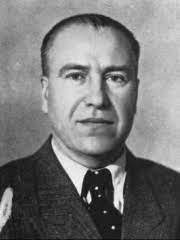Wiese, Leopold von

Bio: (1876-1968) German sociologist and economist. Leopold von Wiese received his Ph.d. in economics from the University of Berlin and lectured at the University of Cologne, where he was also the editor of the Kölner Vierteljahreshefte für Sozialwissenschaften (Cologne Quarterly for Sociology), that he renamed ”Kölner Zeitschrift für Soziologie” in 1948. He was the founder of the Institute for Social Research at the University of Cologne. He belonged to the sociological school of Formalism.
His most significant work is Systematic Sociology (1933, in German 2 vols. 1924, 1929). Wiese believed that sociology should use the methods of natural sciences, therefore, to be an empirical and exact science, free from philosophical speculations and value-normative judgment. Sociology has a clearly defined and limited subject and uses the knowledge of other sciences to formulate its own abstraction of social life. The subject of sociology is interpersonal relations, especially the processes of association, dissociation, and processes that combine these two tendencies. Sociology is not interested in the purpose of the association, but only in the direction and rhythm of these processes. Factors that affect both processes (association and dissociation) are: emotional instincts and impulses, interests, and objective factors. The association contains its sub-processes: advance, adjustment, and amalgamation. The sub-processes of dissociation are: competition, contravention (rule-breaking), and conflict.
Another type of process that Wiese considers is “circumscribed action patterns” which can be associative (integration) and dissociative (differentiation). At the same time, these processes take place at the level of the entire society, but they do not function in opposition but in a complementary way. With the growth of society comes the growth of structures, which leads to the differentiation of that structure in the form of stratification, which is characterized by relations of domination and subordination. On the other hand, circumscribed action patterns lead to the neuropsychological integration of members. Socialization leads people to adopt, more or less, similar patterns of what is considered necessary, desirable, or justified. In addition to these two processes, another pair of dichotomous processes are "constructive" and "destructive" processes. Destructive processes include: exploitation, favoritism, ossification, radicalization, commercialization, and perversion. Constructive processes are: institutionalization, professionalization, and liberation (removing hindering restrictions).
A special segment of Wiese's sociology is his teaching on "plurality patterns" (gebilde). Plurality patterns are relatively permanent social structures that regulate interpersonal relationships. The plurality patterns differ in relative duration and degree of abstraction. The three main types of plurality patterns are: crowds, groups, and abstract collectivities. Crowds can be concrete, and in that sense, they represent visible and time-limited aggregations without leadership; and abstract, when they have no form and no time limit (one example is "public"). The groups are characterized by homogeneity, solidarity, and relatively long duration. Abstract collectivities are defined through their organizational structure and their partial independence from the specific individuals that are in them. The state and the church are typical examples of abstract collectivities.
Fields of research
Conflict Crowd Domination Emotions Group Inequality, Social Instincts Institution and Organization Integration Leaders Liberalism Psychology Socialization Socialism Solidarity TimeTheoretical approaches
Formal SociologyMain works
Zur Grundlegung der Gesellschaftslehre für Volkswirtschaftslehre (1905);
Gedanken über Menschlichkeit (1915);
Staatssozialismus (1916);
Der Liberalismus in Vergangenheit und Zukunft (1917);
Kindheit: Erinnerungen aus meinen Kadettenjahren (1924);
Allgemeine Soziologie als Lehre von den Beziehungsbedingungen der Menschen, 2 Bände (1924/1929);
Soziologie: Geschichte und Hauptprobleme (1926);
Homo sum: Gedanken zu einer zusammenfassenden Anthropologie (1940);
Ethik in der Schauweise der Wissenschaften vom Menschen und von der Gesellschaft (1947);
Erinnerungen (1957);
Philosophie und Soziologie (1959);
Der Mensch als Mitmensch (1964);
Der Mitmensch und der Gegenmensch im sozialen Leben der nächsten Zukunft (1967).
Book translated into English:
Systematic Sociology (1977, in German 1924/1929).

